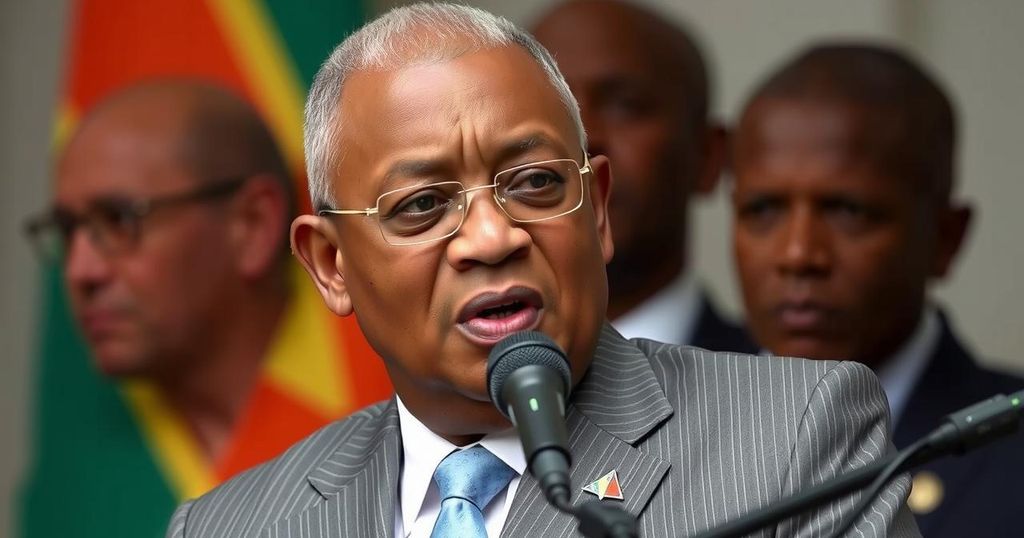Mozambique’s New President Faces Unrest Following Controversial Election
Mozambique’s new president, Daniel Chapo, was inaugurated amid unrest following disputed elections. Opposition leader Venancio Mondlane claims electoral fraud led to protests and violence, resulting in over 300 deaths. Chapo promised to promote unity and democracy, while Mondlane threatened ongoing demonstrations. The political landscape remains tense as both parties seek to address the aftermath of the election.
Mozambique welcomed its new president, Daniel Chapo, who was inaugurated in a heavily guarded ceremony in Maputo following a tumultuous period marked by violent protests over the results of the recent election. The situation had escalated after opposition candidate Venancio Mondlane accused the ruling Frelimo party of electoral fraud, triggering unrest that has reportedly led to over 300 fatalities, as stated by local NGOs.
In his inaugural address, President Chapo pledged to dedicate all his efforts to safeguarding national unity, democratic values, and the advancement of the Mozambican populace. His commitment comes amid threats from Mondlane, who has vowed to disrupt Chapo’s administration through daily protests, emphasizing a lack of peace under the current regime. Mondlane, popular among the youth, maintains that the election held on October 9 was manipulated in favor of the long-ruling Frelimo party.
Chapo, who faces a challenging path ahead, called for a harmonious approach to governance and development, urging citizens to work collectively to stabilize the nation. International observers noted significant irregularities in the electoral process, and the EU criticized the alteration of election outcomes. The presence of few foreign dignitaries at the inauguration raised eyebrows, with analysts suggesting a reluctance to fully recognize Chapo’s victory.
Tensions remain evident with heightened security measures in Maputo as opposition rallies and public dissent loom. Chapo is expected to announce a new cabinet imminently, and analysts suggest that inviting opposition figures to join his government could pave the way for a more peaceful political climate. Although dialogue has been proposed, Mondlane has been omitted from initial discussions with other political leaders. He has publicly expressed his willingness to negotiate, stating that he is ready to engage in discussions for the country’s betterment.
According to the official tally, Chapo secured 65 percent of the presidential vote compared to Mondlane’s 24 percent, while the Frelimo party maintains a strong majority in the parliament. The political landscape of Mozambique remains fragile, and the actions taken by President Chapo in the coming weeks will likely determine the trajectory of national stability and governance in the aftermath of the controversial elections.
Mozambique has been embroiled in political unrest following the elections that took place on October 9, where the ruling Frelimo party faced accusations of electoral manipulation by opposition leader Venancio Mondlane. The Frelimo party, which has held power since the country’s independence in 1975, has been accused of using excessive force to suppress dissent and protests. The recent violence, which reportedly resulted in over 300 deaths, highlights the deep-seated issues of trust and legitimacy in the electoral process, as well as the challenges of governance in a nation rich in natural resources yet plagued by political discord. President Daniel Chapo’s inauguration marks a pivotal moment for the country, as various stakeholders assess the prospects for dialogue and national reconciliation.
The inauguration of Daniel Chapo as Mozambique’s president comes amidst significant political turmoil marked by allegations of electoral fraud and a backdrop of violent protests. The situation remains precarious as Chapo seeks to unify the nation and address the grievances of the opposition, particularly those raised by Venancio Mondlane. With calls for dialogue and potential political concessions, the coming weeks will be crucial in determining whether Mozambique can navigate this period of unrest towards greater stability and governance.
Original Source: www.france24.com




Post Comment